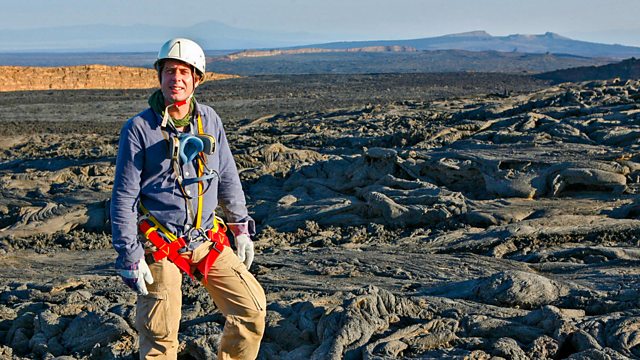Earth: The Power of the Planet episode 1 – Volcano: Dr Iain Stewart reveals the role natural forces have played in the creation of the planet Earth. The first episode discusses volcanoes. Although they appear to be destructive, volcanoes have been crucial to the development of life on this planet. Iain’s journey takes him to Ethiopia to discover lava lakes, to Iceland to scuba dive between continents and to New Zealand to sample some hot springs.
Documentary series. Dr Iain Stewart tells the story of planet Earth. Although they appear to be destructive, volcanoes have been crucial to the development of life.
Earth: The Power of the Planet episode 1 – Volcano
A volcano is a rupture in the crust of a planetary-mass object, such as Earth, that allows hot lava, volcanic ash, and gases to escape from a magma chamber below the surface.
On Earth, volcanoes are most often found where tectonic plates are diverging or converging, and most are found underwater. For example, a mid-ocean ridge, such as the Mid-Atlantic Ridge, has volcanoes caused by divergent tectonic plates whereas the Pacific Ring of Fire has volcanoes caused by convergent tectonic plates. Volcanoes can also form where there is stretching and thinning of the crust’s plates, such as in the East African Rift and the Wells Gray-Clearwater volcanic field and Rio Grande Rift in North America.
Volcanism away from plate boundaries has been postulated to arise from upwelling diapirs from the core–mantle boundary, 3,000 kilometers (1,900 mi) deep in the Earth. This results in hotspot volcanism, of which the Hawaiian hotspot is an example. Volcanoes are usually not created where two tectonic plates slide past one another.
Large eruptions can affect atmospheric temperature as ash and droplets of sulfuric acid obscure the Sun and cool the Earth’s troposphere. Historically, large volcanic eruptions have been followed by volcanic winters which have caused catastrophic famines.
Dr Iain Stewart
Iain Simpson Stewart is a Scottish geologist, UNESCO Chair in Geoscience and Society, and Professor of Geoscience Communication at the University of Plymouth and also a member of the Scientific Board of UNESCO’s International Geoscience Programme. Described as geology’s “rock star”, Stewart is best known to the public as the presenter of a number of science programmes for the BBC, notably the BAFTA nominated Earth: The Power of the Planet (2007).
Stewart returned to television as an expert academic for Helike – The Real Atlantis, a 2002 BBC Horizon film about the destruction of the Greek city of Helike by earthquake and tsunami in 373 BCE, newly rediscovered in 2001. This, he says, “gave me a hunger to get more geology on telly.” He featured in another Horizon film, on earthquakes, in April 2003, before appearing as a team member in the fourth series of Rough Science (shown January/February 2004), a series where a group of scientists is challenged to solve tasks using only the resources of the local surroundings and a small set of supplies.
